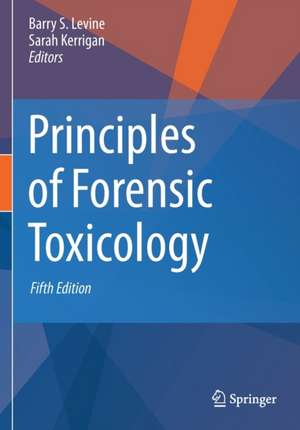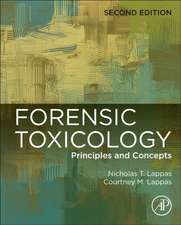Principles of Forensic Toxicology
Editat de Barry S. Levine, SARAH KERRIGANen Limba Engleză Paperback – 19 iun 2021
| Toate formatele și edițiile | Preț | Express |
|---|---|---|
| Paperback (1) | 386.95 lei 3-5 săpt. | +55.36 lei 7-13 zile |
| Springer International Publishing – 19 iun 2021 | 386.95 lei 3-5 săpt. | +55.36 lei 7-13 zile |
| Hardback (1) | 466.77 lei 3-5 săpt. | +64.78 lei 7-13 zile |
| Springer International Publishing – 15 aug 2020 | 466.77 lei 3-5 săpt. | +64.78 lei 7-13 zile |
Preț: 386.95 lei
Preț vechi: 407.32 lei
-5% Nou
Puncte Express: 580
Preț estimativ în valută:
74.04€ • 80.68$ • 62.39£
74.04€ • 80.68$ • 62.39£
Carte disponibilă
Livrare economică 02-16 aprilie
Livrare express 19-25 martie pentru 65.35 lei
Preluare comenzi: 021 569.72.76
Specificații
ISBN-13: 9783030429195
ISBN-10: 3030429199
Pagini: 691
Ilustrații: XIII, 691 p. 188 illus., 23 illus. in color.
Dimensiuni: 178 x 254 x 41 mm
Greutate: 1.21 kg
Ediția:5th ed. 2020
Editura: Springer International Publishing
Colecția Springer
Locul publicării:Cham, Switzerland
ISBN-10: 3030429199
Pagini: 691
Ilustrații: XIII, 691 p. 188 illus., 23 illus. in color.
Dimensiuni: 178 x 254 x 41 mm
Greutate: 1.21 kg
Ediția:5th ed. 2020
Editura: Springer International Publishing
Colecția Springer
Locul publicării:Cham, Switzerland
Cuprins
Part 1: Introduction.- Post Mortem Forensic Toxicology.- Human Performance Toxicology.- Drug-Facilitated Sexual Assault.- Forensic Drug Testing.- Performance enhancing Drug Testing.- Drug Testing in Pain Management.- Pharmacokinetics and Pharmacodynamics.- Part II. Specimen Preparation.- Spectrophotometry.- Chromatography.- Derivatization.- Immunoassy.- Mass Spectrometry.- Quantitation.- Method Validation.- Measurement Uncertainty and Traceability.- Statistics in Forensic Toxicology.- Part III Analytes.- Alcohol.- Benzodiazapines.- Gammahydroxybutyric acid,- Miscellaneous Central Nervous System Depressants.- Opioids.- Cocanie.- Cannabis.- Amphetamines-Sympathomimetic Amines,- Hallucinogens and Psychedelics.- Antidepressants and Neuroleptics.- Miscellaneous Therapeutic Drugs.- Carbon Monoxide/Cyanide.- Inhalants.- Metals.- Part III Special Topics.- Stability of Drugs of Abuse in Biological Systems.- Postmortem Redistribution of Drugs.- Postmortem Clinical Testing.- Pharmacogenomics.- Hair Drug Testing.- Oral Fluid Testing.- Meconium Drug Testing.- Drugs in Embalmed Tissues.
Notă biografică
Barry Levine received his B.S. in Chemistry from Loyola College and a Ph.D. in Toxicology from the Medical College of Virginia. He was Chief Toxicologist, Office of the Chief Medical Examiner, State of Maryland and currently consults with the Office. He was also the Director, Forensic Toxicology Laboratory for the Armed Forces Medical Examiner System. He is an Adjunct Professor in the Forensic Sciences Department, Stevenson University, teaching a course every year in forensic toxicology. Dr. Levine is a fellow of the American Board of Forensic Toxicology and a Diplomate of the American Board of Clinical Chemistry – Toxicological Chemistry. He edited the book widely adopted best-selling book, Principles f Forensic Toxicology, which is now in its fifth edition.
Dr. Kerrigan is the Chair of Forensic Science and the Director of the Institute for Forensic Research, Training and Innovation at Sam Houston State University. Prior to her academic position, she was employed as a forensic toxicologist, quality assurance manager and laboratory director in ASCLD/LAB, ABFT and ISO/IEC 17025 accredited forensic laboratories. Dr. Kerrigan has been active in the area of forensic reform for more than a decade. She is a long-standing member of the Texas Forensic Science Commission and has served on the Forensic Science Standards Board of the Organization of Scientific Area Committees (OSAC) for Forensic science since its inception.
Textul de pe ultima copertă
The fifth edition of the best-selling Principles in Forensic Toxicology continues in the tradition of excellence in academic publishing. With over 10 years of classroom-tested and continually updated content, the new edition contains significant updates and 7 new chapters on new topics including drug-facilitated crimes, derivatization, quantitation, measurement uncertainty/traceability, statistics, oral fluid testing, and drugs in embalmed specimens. Part One covers the major sub-disciplines of forensic toxicology in addition to pharmacological concepts. Part Two addresses specimen preparation, laboratory testing and instrumental analysis, while Part Three discusses common analytes including cocaine, opioids, alcohol, and marijuana. Adopted for courses in many of the top universities for forensic science and used by respected medical examiner’s offices and crime laboratories worldwide, Principles of Forensic Toxicology prepares the next generation of forensic toxicologists and continues to be an important reference in professional practice.
Caracteristici
Over 50% updated content More than 5 new chapters including ones on drug-facilitated crimes and drugs in embalmed specimens Written in collaboration with new editor, Sarah Kerrigan, from Sam Houston State Richly illustrated with over 140 figures and photos Classroom tested for over 10 years Essential information for both forensic science and forensic chemistry students and professional laboratorians




